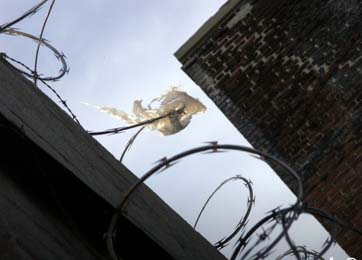We are excited that this month’s blog is a summary of CITY’s two panels at this year’s AAG 2017 in Boston – click below for details…..
CITY presents at the AAG 2017 in Boston Thursday 6th April
_________________________________________________
10th Feb 2017 – NEW BLOG – Philipp Katsinas reviews the workshop, Staying Put, that brought activists and scholars together at the University of Rome Tre to discuss the theory and praxis of anti-gentrification in Southern Europe.
philipp-katsinas-reviews-anti-gentrification-workshop-staying-put/
Including comment by Professor Loretta Lees and Dr. Sandra Annunziata (Department of Geography, University of Leicester).
Latest blog: A reflection on John Berger’s passing by Antonis Vradis Jan 8th 2017.
A reflection on John Berger’s passing by Antonis Vradis Jan 8th 2017.
The latest issue CITY: Vol 20, issue 5 (2016) is now online
http://www.tandfonline.com/toc/ccit20/20/5?nav=tocList …
Shorter for TWEETING http://bit.ly/2hY8PLP #city_analysis
With Bob Catterall’s latest Editorial…..
http://www.tandfonline.com/doi/full/10.1080/13604813.2016.1261554
CITY’s November’s blog just out:
Andrea Gibbons talks to Debbie Humphry about about race, class and segregation in the USA. They discuss Andrea’s short story, The El Rey Bar (link below), and her article Linking Race, the Value of Land and the Value of Life in CITY Issue 20(6). Andrea reflects on socio-spatial walls, and the work, alliances and resistance required in the wake of Donald Trump’s election victory. . http://www.city-analysis.net/2016/11/29/andrea-gibbons-talks-to-debbie-humphry-about-the-el-rey-bar-and-race-and-class-segregation-in-the-usa/
Exclu sive access to Andrea Gibbons’ short story The El Rey Bar
sive access to Andrea Gibbons’ short story The El Rey Bar
set in dystopic South Central Los Angeles, discussed in Bob Catterall’s Editorial: Utopia on the Edge? City, 2016, Vol 20, No. 3, 343-34
The El Rey Bar by Andrea Gibbons
From the heart-gripping anthology Send My Love and a Molotov Cocktail: Stories of Crime, Love and Rebellion, Editors Gary Phillips and Andrea Gibbons
_________________________________________________________________________
Future Suspended is from Crisis-scape research project examining crisis-ridden urban public spaces in Athens, Greece. www.crisis-scape.net
The film addresses the question posed by Antonis Vradis, “What may a major global financial crisis actually look like? How may it feel, what kind of shape and form may it take in the mundane and in the common, in the spaces of our everyday co-existence?” (‘Crisis-scapes suspended: Introduction’, CITY 2014, vol 18, nos 4-5, p.498). For editorial and articles relating to Future Suspended and its themes see CITY Vol. 18 nos 4-5.
Latest issue of CITY, Volume 20, Number 3, June 2016
Editorial: Utopia on the edge?
by Bob Catterall, Editor-in-Chief
Abstract
This ‘gritty’ and disturbing characterisation of future urban worlds is one that Stephen Graham puts forward at one point in the most recent of his wide-ranging studies of urban and technological futures, this one on the vertical dimension of cities.2 How else can we characterise ‘urban worlds’? Might we need to make use of speculative, utopian and fictional perspectives?
If some of the characterisations, or perhaps just some of the characteristics, are deeply and increasingly disturbing, how might we set about reforming or transforming that/those world/s? Are speculative, utopian and fictional visions largely irrelevant, dangerous or obsolete—or almost or just beyond our reach on or at the edge? What then?
We draw in this issue3 on descriptions and analyses, touching unevenly on these topics, on aspects of London, Europe, Jerusalem and Palestine, North America, Shanghai and the Gulf. We include a rural/ ‘developing’ area of Ecuador seen from a cosmic view of the planet as our ‘worlds’ begin to enter and sometimes resist, the ultimate in apocalyptic global futures, ‘black hole capitalism’.
We present this critical editorial survey through examining four sets of scenes using a mixed spatial and cultural/economic classification: first, ‘At the Centre?’ second, ‘Alpha, Aliph. Aleph: Scenes from the South-East’; and the third, ‘On the Edge?’ concluding with ‘Utopian Reciprocities: From the Edge to the Centre (and back)’.
Full editorial on Taylor & Francis website http://www.tandfonline.com/doi/full/10.1080/13604813.2016.1196061
Page 343-349 | Published online: 01 Jul 2016
News
Latest August 2016
Exclusive CITY interview with Ken Loach and Aditya Chakrabortty as they talk to Debbie Humphry about the Housing and Planning Act (2016). http://www.city-analysis.net/2016/08/15/a-disaster-for-ordinary-people-exclusive-interviews-with-ken-loach-and-aditya-chakrabortty-on-the-uk-housing-and-planning-act-2016/
Award-winning film director, Ken Loach, says “The Tory propaganda of a home-owning democracy is now no more than a fantasy. People are becoming private renters, with landlords making a profit out of them. So the sale of social housing is disastrous.“ ”
Aditya Chakrabortty, senior economics writer for the Guardian, tells us “The Act is dreamt up by people who plainly have an agenda against social housing”
News
London’s Housing Crisis and its Activisms Conference
Saturday 23rd April 2016
University Square Stratford, 1 Salway Road,
Stratford, London E15 1NF
This one day conference launches a forthcoming CITY Special Feature on ‘London’s Housing Crisis and its Activisms’, co-edited by Paul Watt (Birkbeck) and Anna Minton (UEL)… more >>
Update: Academe or Agora? Re-situating the Urban Epistemology Debate
– On the debate that has arisen over the combined publication of Brenner and Schmid’s ‘Towards a new epistemology of the urban?’ and the response from Walker in City Issue 19: 2-3.
Free virtual special issue of CITY – Reclaim the city and the planet!
 Free Virtual Special Issue of CITY from the CITY panel from this years Annual conference of the Royal Geographical Society, entitled ‘Reclaim the city and the planet!‘
Free Virtual Special Issue of CITY from the CITY panel from this years Annual conference of the Royal Geographical Society, entitled ‘Reclaim the city and the planet!‘
Selection of articles from the journal free to download! http://bit.ly/cityvsi
See also: Editorial to the special issue Introducing and resituating a debate about ‘planetary urbanisation’
Feature
 Cities and the Planet
Cities and the Planet
As the pace of ecological destruction and climate change accelerate globally, presenting greater and more widespread threats to humanity than ever before – we ask what kind of future lies ahead for the industrialised city? Over the last decade Adrian Atkinson’s work in CITY has looked in detail at the likely impacts of peak oil on urban space and our modern technological society, on the ‘downward passage’ and potential pathways of action for easing the coming transformation – on permaculture, transition, urban and peri-urban agriculture. We feature excerpts from a number of his papers here:
– UPDATE: TED Talk with Adrian Atkinson | ‘Where is Our Civilisation Heading?’ | TEDxViennaSalon
– Readjusting to reality: Urban and peri-urban agriculture to ease the downward passage
– Readjusting to reality 2: Transition, (with Julie Viloria)
– Contemplating the post-fossil fuel world
– Cities after oil: what future is this, fast approaching?
– Response to Monbiot’s “There’s enough [oil] to fry us all”: A look at what oil is left and what recovering it will mean for life on Earth
 From the first 2 parts of a related series, CITY editor Bob Catterall explores the work of artist / filmmaker Patrick Keiller “The Robinson Institute” in relation to urban studies and political geography, its critique of the urbanization and possibilities for a rediscovering of nature and the commons:
From the first 2 parts of a related series, CITY editor Bob Catterall explores the work of artist / filmmaker Patrick Keiller “The Robinson Institute” in relation to urban studies and political geography, its critique of the urbanization and possibilities for a rediscovering of nature and the commons:
– Towards the great transformation: (1) Beyond ‘the urban revolution’
– Towards the great transformation: (2) Nature, Marx’s ‘Old Mole’, and ‘Robinson’
 See also on the topic of sustainable cities:
See also on the topic of sustainable cities:
– The Urbal Fix: creating truly sustainable cities, Tom Bliss
– Building resilience and well-being in the Margins within the City, Rachel Unsworth (and others)
Feature
 The London Olympics: contributors to this special feature in CITY explore London and other World Cities alongside the Olympics, as a specific yet incredibly influential transnational phenomenon; it’s corporate, military/securitised and class-conflict-dimensions.
The London Olympics: contributors to this special feature in CITY explore London and other World Cities alongside the Olympics, as a specific yet incredibly influential transnational phenomenon; it’s corporate, military/securitised and class-conflict-dimensions.
– Editorial: ‘The Olympics, London – and Totalitarianism?’
– Interview: Games Monitor: Undermining the hype of the London Olympics, by Andrea Gibbons and Nick Wolff
– Olympics 2012 security: Welcome to lockdown London, by Stephen Graham
– See also: Class-ifying London: Questioning social division and space claims in the post-industrial metropolis, by Mark Davidson and Elvin Wyley.
Feature
 The Occupy Wall Street movement has inspired occupations of public space by citizens in towns and cities all over the world – in response to the intensification of inhumane, neoliberal policies everywhere sacrificing 99% of people for the profits of the 1%. Following on from the hugely successful mass mobilization of the indignados in Spain, which occupied central plaza’s all over the country; and the same display of mass resistance in Syntagma Square in Greece, or Tahrir Square in Egypt, and beyond… read more >>
The Occupy Wall Street movement has inspired occupations of public space by citizens in towns and cities all over the world – in response to the intensification of inhumane, neoliberal policies everywhere sacrificing 99% of people for the profits of the 1%. Following on from the hugely successful mass mobilization of the indignados in Spain, which occupied central plaza’s all over the country; and the same display of mass resistance in Syntagma Square in Greece, or Tahrir Square in Egypt, and beyond… read more >>
See also on OWS on our website:
– “We are not commodities” – debating the future of occupy
– WHAT SPACE TO OCCUPY IN NEW YORK: A Two-Site Solution?, by Peter Marcuse
– The purpose of the occupation movement and the danger of fetishizing space, by Peter Marcuse
– Open letter to: Assembly Speaker Sheldon Silver, et al., by Peter Marcuse
Message from the Editor
“City’s success derives from its distinctive mission. What other urban studies journal is able to appeal to researchers, activists and policy makers in equal measure? City has somehow managed to build much needed bridges between these communities. It enables conversations to occur between all those committed to a socially just and ecologically sane vision of city life. If City did not exist, you’d have to invent it.” (Professor Noel Castree, Professor of Geography, University of Manchester, UK)[i] City was originally founded as a journal with the distinctive mission (see Journal) that Castree defines – to bridge the gaps between urban researchers, activists and policy-makers – but also to reach a wider audience. The latter mission was to reach out beyond these three groups on its ‘home’ planet, in terms of the language of space travel, to ‘intelligent life outside.’ Read more…



























